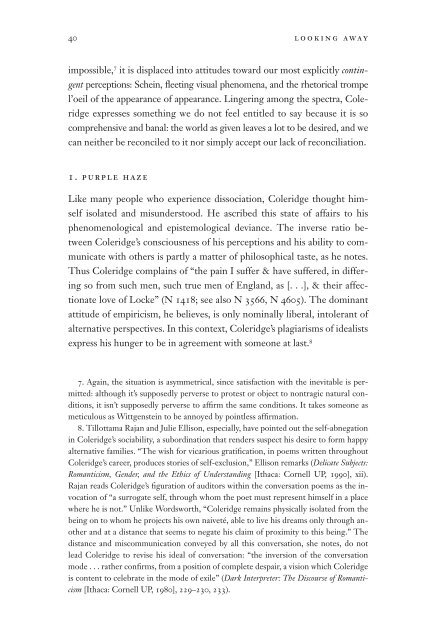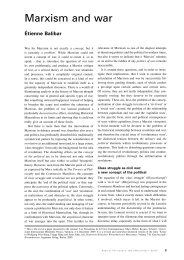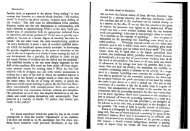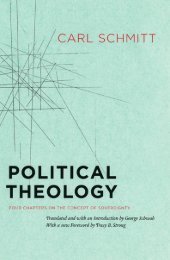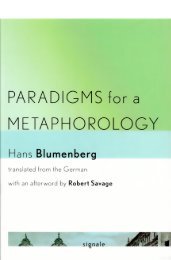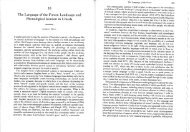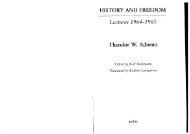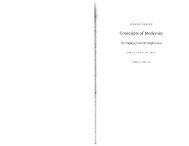Terada - Looking Away (Selections).pdf - Townsend Humanities Lab
Terada - Looking Away (Selections).pdf - Townsend Humanities Lab
Terada - Looking Away (Selections).pdf - Townsend Humanities Lab
Create successful ePaper yourself
Turn your PDF publications into a flip-book with our unique Google optimized e-Paper software.
40 looking away<br />
impossible, 7 it is displaced into attitudes toward our most explicitly contin-<br />
gent perceptions: Schein, fleeting visual phenomena, and the rhetorical trompe<br />
l’oeil of the appearance of appearance. Lingering among the spectra, Cole-<br />
ridge expresses something we do not feel entitled to say because it is so<br />
comprehensive and banal: the world as given leaves a lot to be desired, and we<br />
can neither be reconciled to it nor simply accept our lack of reconciliation.<br />
1. purple haze<br />
Like many people who experience dissociation, Coleridge thought himself<br />
isolated and misunderstood. He ascribed this state of affairs to his<br />
phenomenological and epistemological deviance. The inverse ratio between<br />
Coleridge’s consciousness of his perceptions and his ability to communicate<br />
with others is partly a matter of philosophical taste, as he notes.<br />
Thus Coleridge complains of “the pain I suffer & have suffered, in differing<br />
so from such men, such true men of England, as [. . .], & their affectionate<br />
love of Locke” (N 1418; see also N 3566, N 4605). The dominant<br />
attitude of empiricism, he believes, is only nominally liberal, intolerant of<br />
alternative perspectives. In this context, Coleridge’s plagiarisms of idealists<br />
express his hunger to be in agreement with someone at last. 8<br />
7. Again, the situation is asymmetrical, since satisfaction with the inevitable is permitted:<br />
although it’s supposedly perverse to protest or object to nontragic natural conditions,<br />
it isn’t supposedly perverse to affirm the same conditions. It takes someone as<br />
meticulous as Wittgenstein to be annoyed by pointless affirmation.<br />
8. Tillottama Rajan and Julie Ellison, especially, have pointed out the self-abnegation<br />
in Coleridge’s sociability, a subordination that renders suspect his desire to form happy<br />
alternative families. “The wish for vicarious gratification, in poems written throughout<br />
Coleridge’s career, produces stories of self-exclusion,” Ellison remarks (Delicate Subjects:<br />
Romanticism, Gender, and the Ethics of Understanding [Ithaca: Cornell UP, 1990], xii).<br />
Rajan reads Coleridge’s figuration of auditors within the conversation poems as the invocation<br />
of “a surrogate self, through whom the poet must represent himself in a place<br />
where he is not.” Unlike Wordsworth, “Coleridge remains physically isolated from the<br />
being on to whom he projects his own naiveté, able to live his dreams only through another<br />
and at a distance that seems to negate his claim of proximity to this being.” The<br />
distance and miscommunication conveyed by all this conversation, she notes, do not<br />
lead Coleridge to revise his ideal of conversation: “the inversion of the conversation<br />
mode...rather confirms, from a position of complete despair, a vision which Coleridge<br />
is content to celebrate in the mode of exile” (Dark Interpreter: The Discourse of Romanticism<br />
[Ithaca: Cornell UP, 1980], 229–230, 233).


